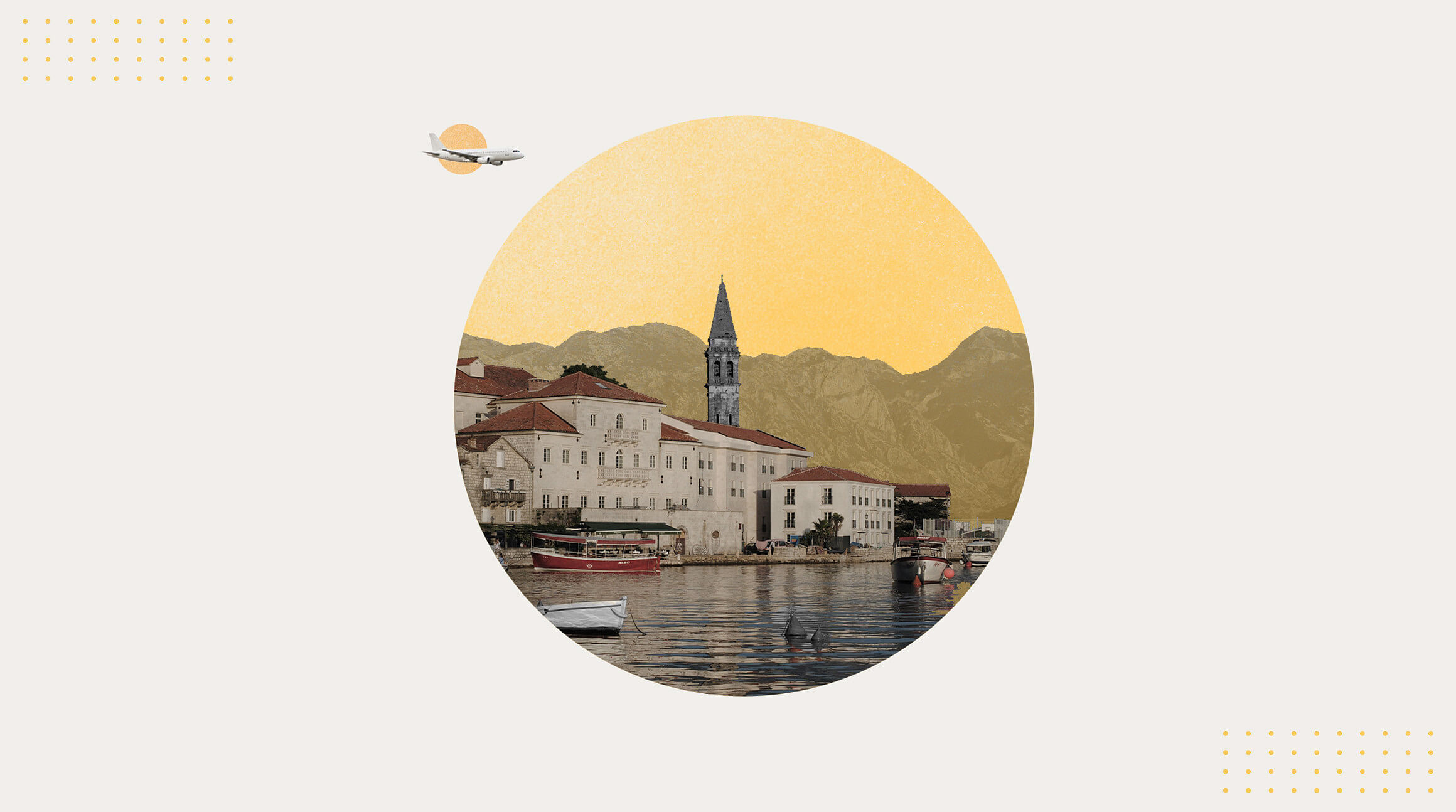
Not too long ago, Montenegro was one of Europe's best-kept secrets.
But recently, this pocket-sized paradise along the Adriatic has stepped into the spotlight.
A country that has long been overshadowed by its Balkan neighbours and Mediterranean hotspots, Montenegro is quietly becoming one of the best places to visit in Europe.
But that's not to say it's overcrowded yet. Far from it.
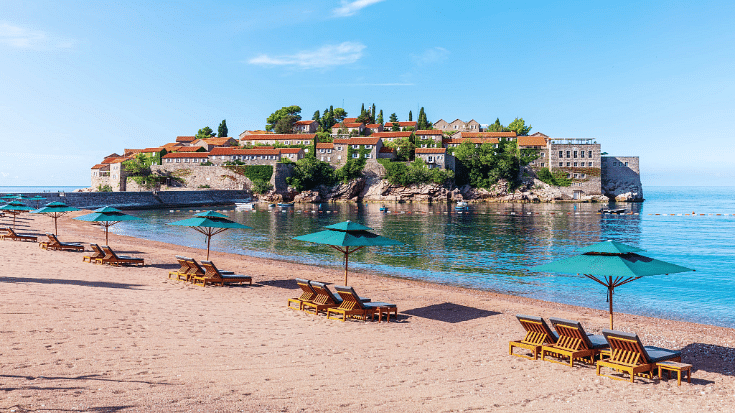
Adobe Free Stock / AlexAnton
While Croatia has become so popular that overtourism measures are in motion, its humble but no less spectacular neighbour to the South offers similarly stunning coastlines with fewer crowds.
If you like what you hear and are interested in planning a trip to Montenegro, this travel guide will fill you in on the facts.
Jump To:
👉 Montenegro - Getting There From the UK and Ireland
👉 A Brief Dive Into Montenegro's History
👉 Podgorica - Montenegro's Underrated Capital
👉 Kotor - The Instagram Darling
👉 Budva - Beach Days And Nights Out
👉 Durmitor National Park - For The Adventurers
👉 Lake Skadar - Nature's Masterpiece
👉 Ulcinj - Where East Meets West
👉 A Taste of Montenegro - Foods and Drinks to Try
👉 When's The Best Time To Go To Montenegro?
👉 Onward Travel From Montenegro
👉 Staying Connected In Montenegro
👉 FAQs
Why is Montenegro trending?
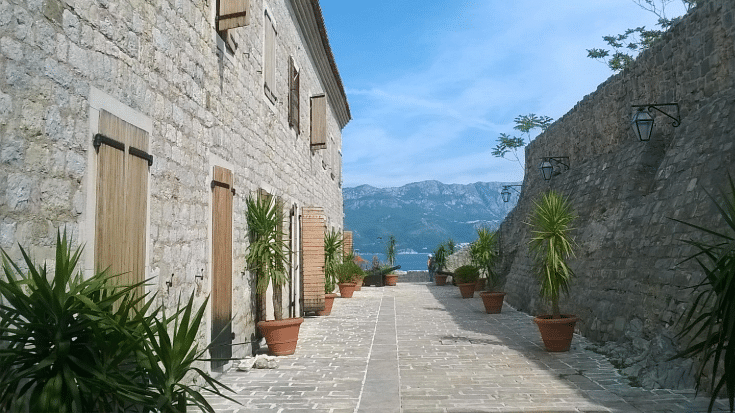
Image Owned By Author
So, why is Montenegro trending? In short, because it's got the goods.
- Mountains that give the Alps a run for their money.
- Beaches that belong in a honeymoon catalogue.
- Food and wine that cost half what you'd pay in Italy, but taste just as good.
- And the best bit? Fewer crowds. For now.
Montenegro is hands-down one of the most surprising, varied and beautiful countries I've ever visited. And it's one of those places you promise yourself you'll return to.
It's also still got that off-the-beaten-track magic - but it won't stay a secret for long.
So now's the time to book that trip and see what it's all about.
Montenegro - Getting There From The UK and Ireland
Montenegrins are among the tallest people on Earth. The average height for women comes in at 170 cm, that's five feet seven inches. The average height of Montenegrin men is 183 cm, or six feet.
Getting to Montenegro from the UK is simple, especially during the spring and summer seasons.
Direct flights are available from London, Manchester, Leeds-Bradford and Birmingham to either Podgorica Airport or Tivat Airport.
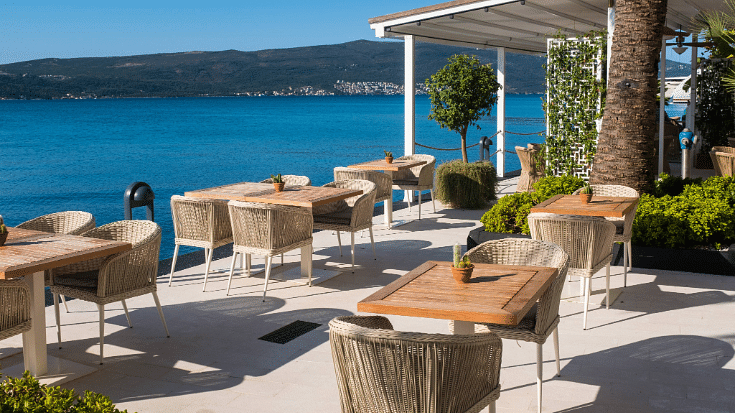
Adobe Free Stock / Renat
Travellers from the Republic of Ireland or Northern Ireland will need to connect via another European city.
At the time of writing, no direct flights operate from Dublin or Belfast.
Flight time averages around two and a half to three hours.
Which Airports Can I Fly Into?
Podgorica Airport is a small but modern hub about 11km from the capital city.
Tivat Airport serves the coastal regions and is best for those heading directly to the likes of Kotor and Budva.
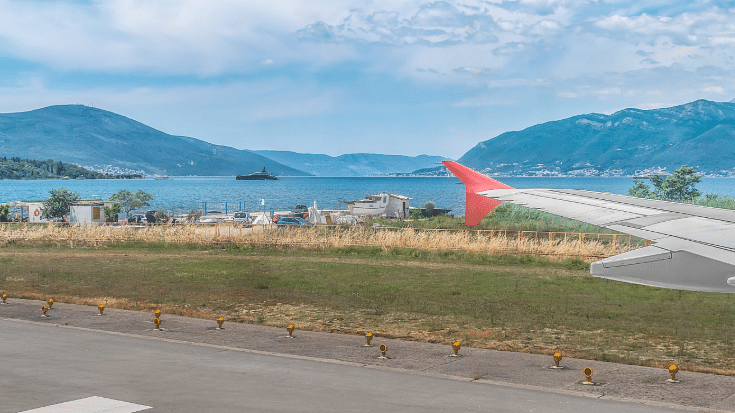
Tivat Airport / Adobe Free Stock / ioanna_alexa
Cheap Flights to Montenegro - Still A Thing
If you're looking for a bargain budget flight, September and October tend to be the best months to find deals.
You might bag a return flight from the UK for somewhere around £40 to £60.
Budget carriers often operate seasonal routes with competitive prices, especially if you book in advance.
A Brief Dive Into Montenegro's History
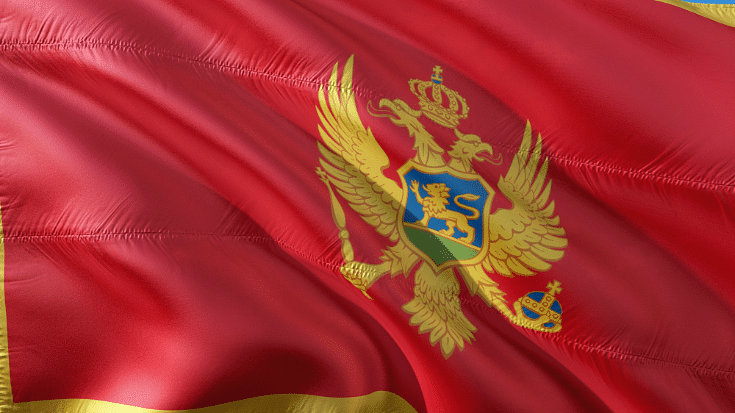
Montenegro's Dramatic History - And Why It's Worth Knowing
You don't need a history degree to fall for Montenegro.
But knowing a bit of its backstory helps explain the moody mountain fortresses, Ottoman-era alleyways and coastal towns that look suspiciously Italian.
Over the centuries, Montenegro has been claimed, conquered and argued over between empires like a Balkan tug-of-war.
Romans, Byzantines, Venetians, Ottomans - they've all tried to stake a claim in this beautiful coastal territory.
The result? A cultural mash-up you can see in the stone walls, taste in the food and feel when a local tells you they're Montenegrin, not just Balkan or Mediterranean.
Montenegro played its own national anthem at the 2006 Eurovision semi-final, months before the country officially became independent. Talk about an iconic power move.
Modern Montenegro - Small Country, Big Energy
Montenegro only became fully independent in 2006, which makes it one of Europe's youngest countries.
But don't let the baby-faced passport fool you. It's already punching above its weight as a holiday spot.

Image Owned By Author
Sun-drenched beaches, epic mountains, hearty food and wallet-friendly prices?
That's the new Montenegro vibe. Still proudly independent, still shaped by centuries of outside influence.
But now open to curious travellers who want something a bit different from Spain-for-the-18th-time.
Podgorica - Montenegro's Underrated Capital
Most travellers skip straight to the coast. But that's their loss.
Montenegro's capital city, Podgorica, deserves at least a day of your time.
Podgorica isn't flashy like the seaside towns. But it offers a glimpse into authentic local life with a touch of modern flair.
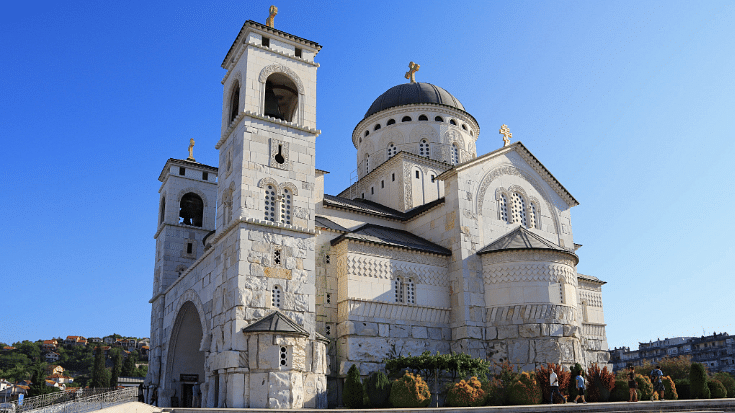
Adobe Free Stock / Lindasky76
What Not To Miss In Podgorica
- Millennium Bridge - Modern and very photogenic, especially at sunset.
- Centre for Contemporary Art - Showcasing impressive local talent and Eastern European edge.
- Stara Varoš, Old Town - Here you'll find Ottoman-era buildings and tiny cafés serving excellent coffee.
It's also one of the cheapest capitals in Europe, so a good shout for budget-conscious travellers.
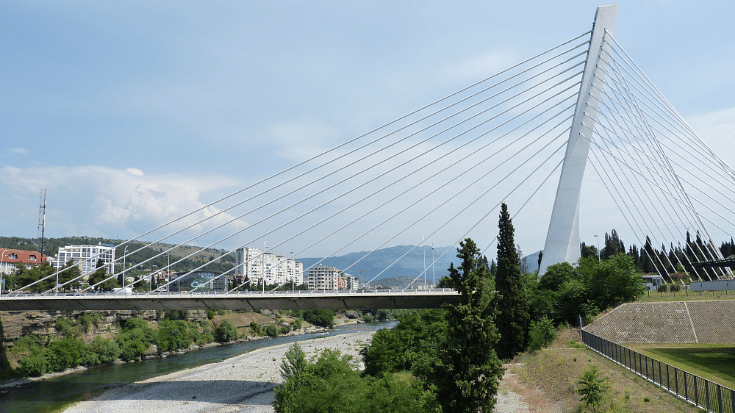
Kotor - The Instagram Darling
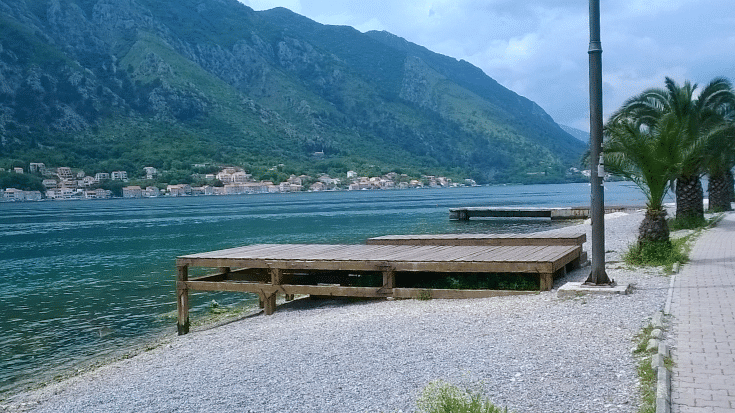
Image Owned By Author
If you've ever seen a photo of Montenegro on social media, chances are it was taken in Kotor.
A medieval town sitting at the end of Europe's southernmost fjord, it skirts the impossibly beautiful Bay of Kotor, with its blue waters and limestone cliffs.
The UNESCO-listed Old Town hides behind massive stone walls.
Venetian palaces and Orthodox churches line twisting cobblestone streets.
Getting lost here among its squares, shops, cafes and bars is sheer joy.
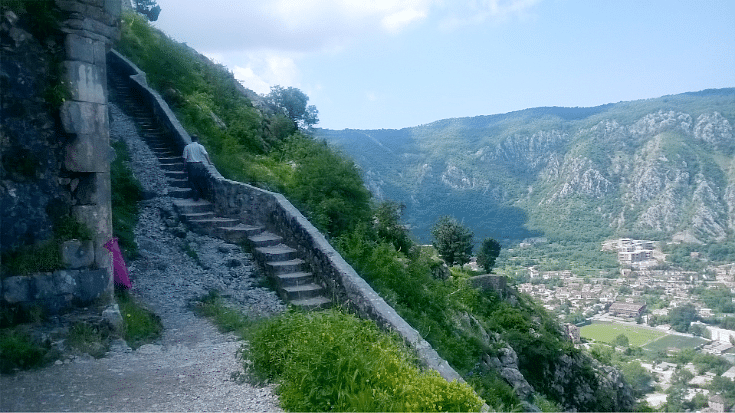
The Climb To The Monastery / Image Owned By Author
Top Things to Do in Kotor
- Wander Kotor's Old Town - Cobbled alleys, hidden squares and ancient churches galore. But try to avoid busier times when cruise ships pull in.
- Climb Kotor Fortress - From Old Town, you can climb up into the hills for around an hour to some incredible lookout points over the bay. This moderate hike equals massive rewards.
- Take A Trip To Perast and Our Lady Of The Rocks - The latter is a man-made floating church island. Yep, as odd and magical as it sounds.
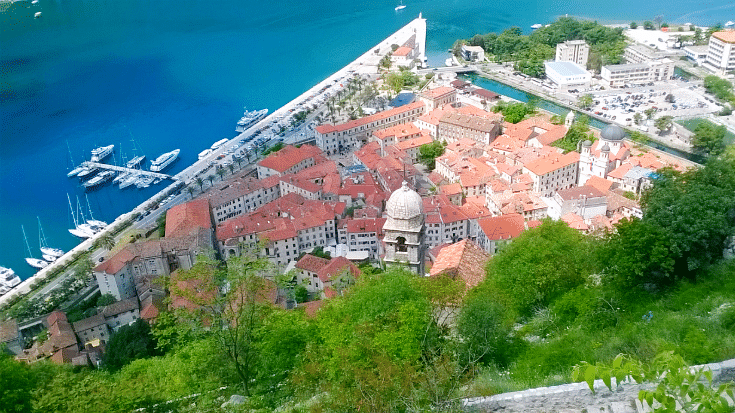
The Hills Above Kotor / Image Owned By Author
Kotor's other claim to fame? Cats. Hundreds of well-fed felines roam the Old Town.
They're so beloved, in fact, that there's a whole museum dedicated to them.
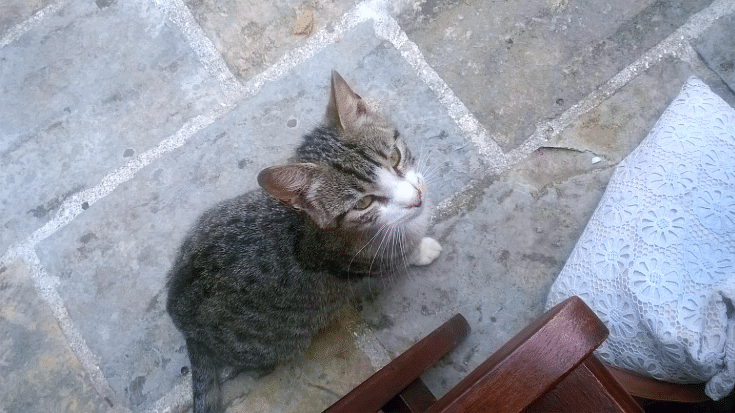
Image Owned By Author
Local legend has it that sailors brought cats to protect valuable cargo from rats.
Today, they're unofficial mascots with miniature cat houses scattered throughout the town.
Budva - Beach Days And Nights Out
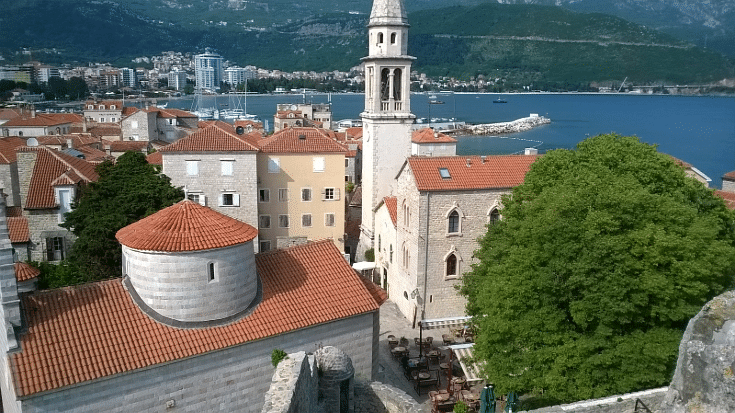
Image Owned By Author
Just 30 minutes down the coast from Kotor lies Budva - Montenegro's answer to Ibiza.
However, for those who like a little culture, Budva isn't just parties and sun.
Budva's walled Old Town is beautiful, compact, ripe for exploring and perfect for handmade souvenir hunting.
Dating back 2,500 years, it's one of the Adriatic's oldest settlements.
By day, Budva serves some seriously stunning beaches and crystal-clear waters.
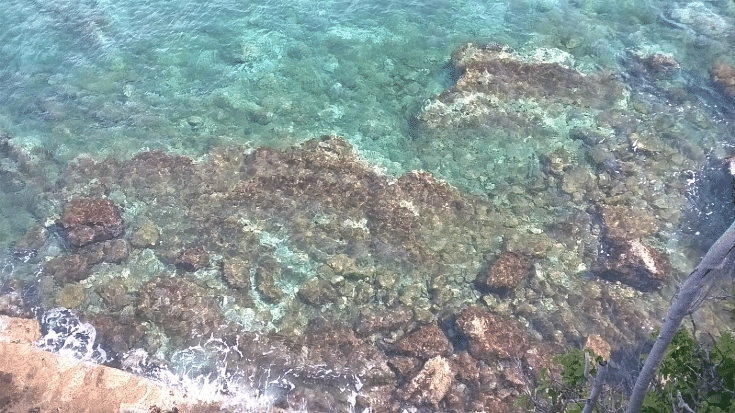
Budva''s coastal waters / Image Owned By Author
The slightly tucked away Mogren Beach offers golden sands and clear waters just minutes from Budva's Old Town.
Slovenská Beach stretches for 1,600 metres with loungers, water sports and seafront restaurants.
When the sun sets, Budva transforms. Bars open their doors along the marina. Top DJs spin tracks until sunrise in summer.
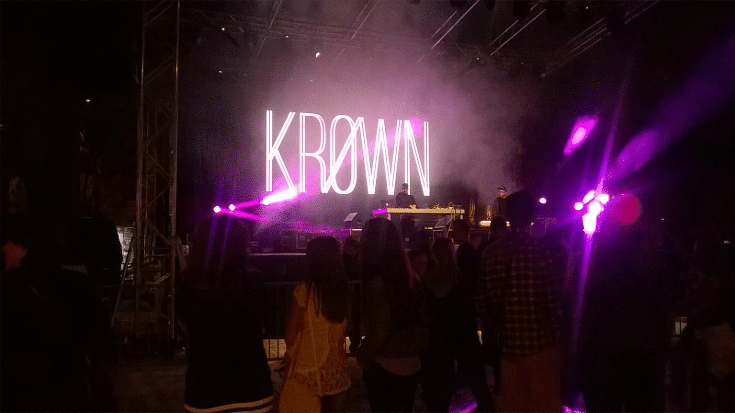
DJs at night, Budva / Image Owned By Author
If you're after something more low-key, seafront cocktail bars provide perfect sunset-watching spots.
Top Things to Do in Budva
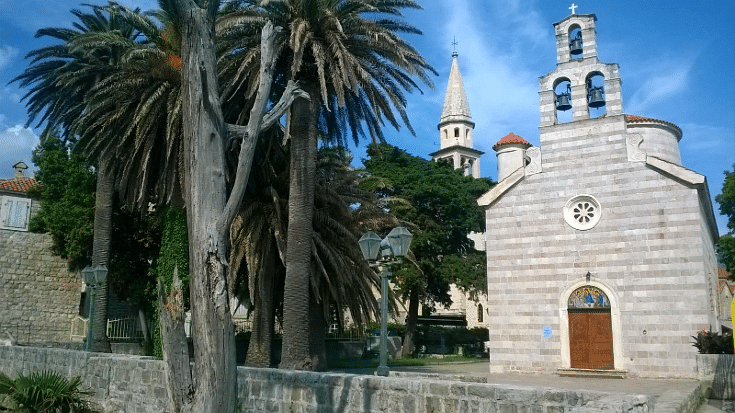
Budva Old Town / Image Owned By Author
- Mogren Beach - Sandy, sun-drenched and close to Budva Old Town.
- Budva Citadel - Gives you great views and a bit of culture between cocktails.
- Dive Into the Seafood - Budva is an excellent place to try seafood - from seabass and squid to grilled octopus, you won't be disappointed.
- Paragliding - If you're into adrenalin, you can go up into the hills overlooking the coast and paraglide down to the beach.
- See Sveti Stefan from Afar - Climb to St Sava Church for a view of the tiny scenic island Sveti Stefan. Although it's currently private with no public access, the view from the hills is worth it.
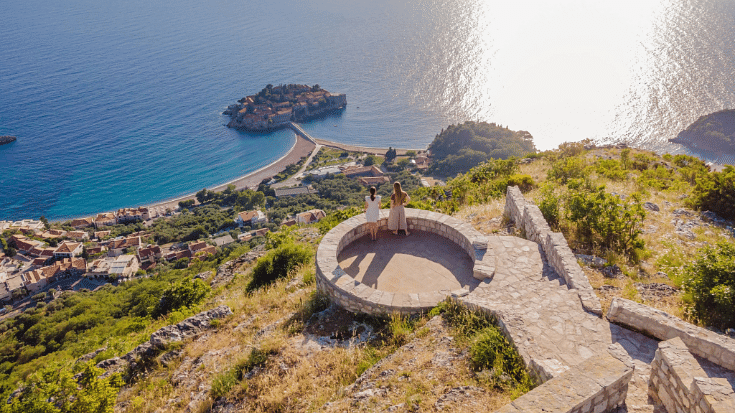
The View of Sveti Stefan from St Sava Church / Adobe Free Stock / galitskaya
Durmitor National Park - For The Adventurers
Montenegro isn't just about coastlines.
It's fast becoming recognised by outdoor enthusiasts as a top destination for adventure travel.
Head inland to discover why the country's name means 'Black Mountain'.
Durmitor National Park is the outdoor jewel in the country's crown and showcases Montenegro's wild side.
This UNESCO World Heritage site is home to limestone peaks, glacier lakes and Europe's deepest canyon.
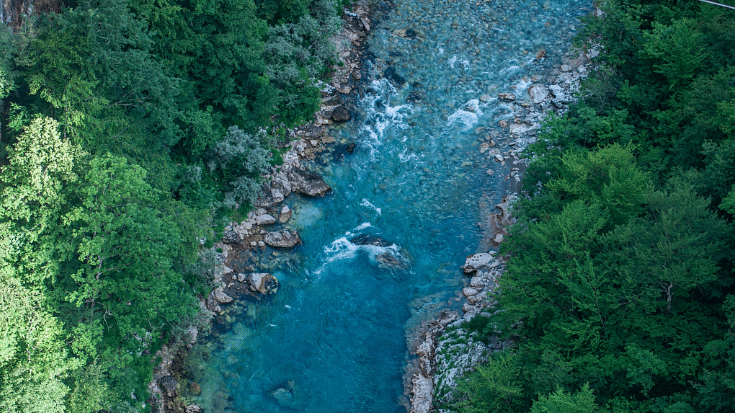
Adobe Free Stock / dusan
Top Things To Do In Durmitor National Park
- White Water Rafting In Tara River Canyon - It's the second-deepest canyon in the world, second only to the Grand Canyon, and boasts some of the best white water rafting in Europe.
- Hiking - The park has no end of trails, which wind through alpine meadows and dramatic peaks.
- Winter Adventures - In winter, the park is a snow-covered wonderland. It offers skiing, snowboarding, snowshoeing and snowy hiking opportunities, with the town of Žabljak serving as a base.
- Wildlife Spotting - You might spot bears, wolves and eagles. Just keep your snacks well hidden.
Lake Skadar - Nature's Masterpiece
Straddling the border with Albania, Lake Skadar forms the largest lake in Southern Europe.
The Montenegrin side offers a perfect escape from coastal crowds.
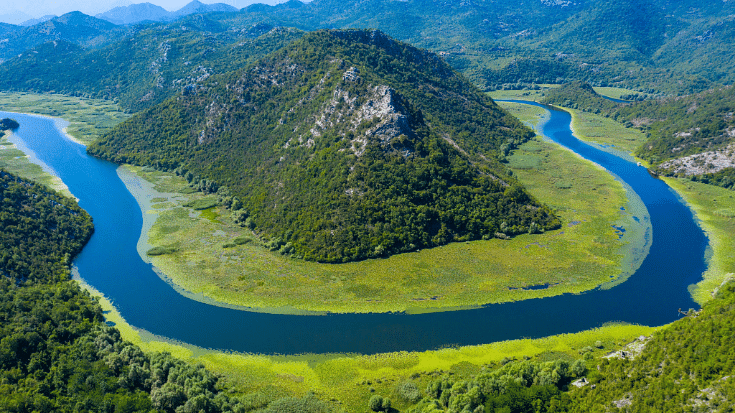
Adobe Free Stock / M.studio
Bird enthusiasts, bring your binoculars. The lake serves as home to over 280 bird species.
The Dalmatian pelican colony represents the lake's most famous residents. These rare birds with three-metre wingspans nest among the reeds.
Best Things To Do At Lake Skadar
- Boat Tours - Glide past floating monasteries and lily-covered shallows.
- Wine Tasting - Vineyards line the lakeside and produce some stunningly good numbers.
- Birdwatching - You could see pelicans, herons and hundreds of other species here - David Attenborough would approve.
Ulcinj - Where East Meets West
At Montenegro's southern edge lies Ulcinj, a town with a distinct Ottoman character.
For centuries, it served as a pirate stronghold. Today, it's known for Albania-influenced cuisine and the country's best beaches.
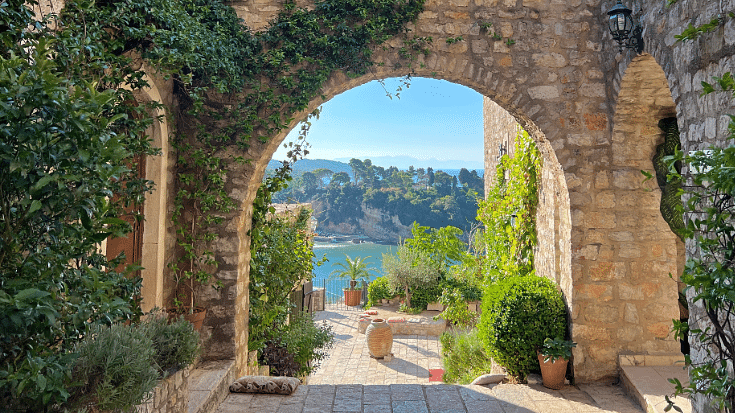
Adobe Free Stock / OLENA
Top Experiences in Ulcinj
- Velika Plaža, aka. Long Beach - Stretching for 13 kilometres, kitesurfers flock here for consistent winds, especially in spring and autumn.
- Ada Bojana - For a unique experience, head to this triangular island formed by river delta. One side features a clothing-optional beach, while the other offers rustic seafood restaurants built on stilts over the water.
- Ulcinj's Old Town - Sitting on a cliff overlooking the sea, its stone fortress once housed thousands of pirates. Now, its winding lanes contain coffee shops and art galleries.
A Taste of Montenegro - A Guide to Montenegrin Food

Čevapi / Adobe Free Stock / myviewpoint
Montenegro's cuisine is a delicious mix of Mediterranean lightness and Balkan comfort food.
Perhaps unsurprisingly, seafood takes centre stage on most menus along the coast.
Try black risotto coloured with cuttlefish ink or brodet, a rich fish stew.

Adobe Free Stock / Yulia Furman
Octopus salad makes a perfect light lunch in the summer heat.
Inland, meat becomes the star. Njeguški pršut, or prosciutto, from Mount Lovćen is popular among the locals.
This is largely thanks to the mountain air, which creates perfect curing conditions.
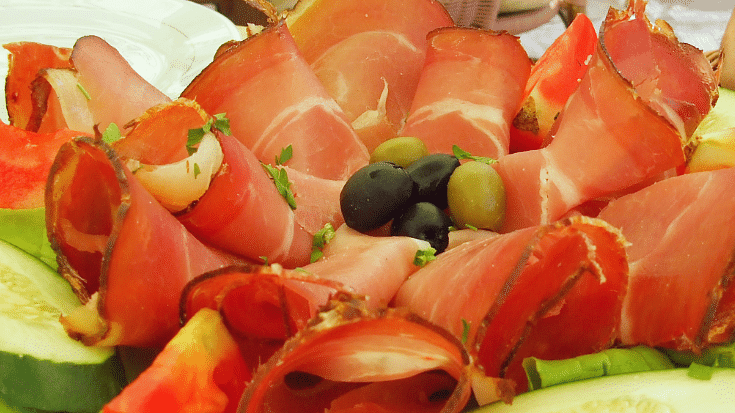
Njeguški pršut / Wikimedia Commons / Haydn Blackey
Pair it with local cheese and a glass of Vranec and you're onto a Montenegrin winner.

Priganice / Wikimedia Commons / Milica Buha
Don't leave Montenegro without trying these local dishes.
Which Foods To Try in Montenegro
- Čevapi - Grilled sausages served with flatbread and onions. Great with a beer.
- Burek - A flaky pastry filled with meat, cheese or spinach, this is a regional classic - you can't go wrong.
- Seafood - Octopus salad, black risotto, fresh calamari - you'll be spoiled for top-quality seafood in Montenegro.
- Njeguški pršut - You must try this local smoked ham, which rivals anything from Parma.
- Kačamak - This hearty porridge is made from cornmeal and potato and is typically served with kajmak, which is a bit like clotted cream.
- Priganice - Dig into these fried dough balls drizzled with honey or served with cheese - enough said.
What To Drink In Montenegro

Rakija - Approach With Caution / Adobe Free Stock / rastkobelic
- Vranec wine - Montenegro's signature red wine. Bold, dark and dangerously drinkable.
- Rakija - A Balkan favourite, this fruit brandy could often double as a disinfectant and many families brew their own. Try if you dare.
- Coffee culture thrives in Montenegro. Try 'dojč kafa', the local twist on a latte, with a lighter, milkier taste.
In the coastal town of Bar, you'll find an olive tree that's over 2,000 years old. It still produces olives and looks like it could give you life advice.
When's The Best Time To Go To Montenegro?
Montenegro is a year-round destination. And the best time to visit really depends on what you're after - beaches, hiking, festivals or snow-capped scenery.
Here's a quick breakdown to help you choose.
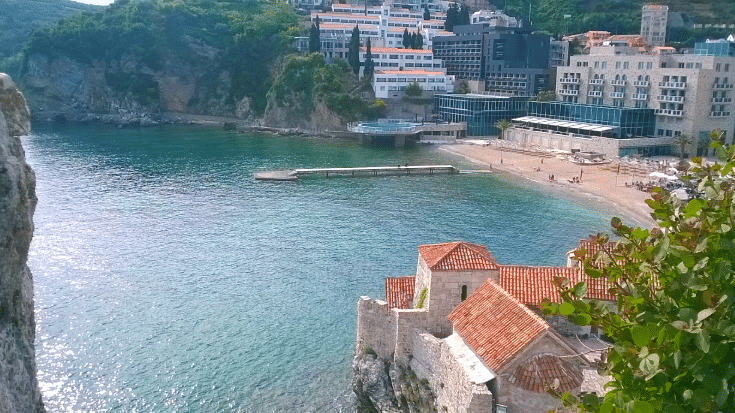
Image Owned By Author
Spring - April to June
Spring in Montenegro is lush, peaceful and pleasantly warm.
Wildflowers bloom across the countryside and coastal towns are calmer.
It's the best time for hiking, cycling and exploring towns like Perast or Ulcinj without the crowds.
Prices are lower and flight deals are easier to come by.
Summer - June to August
This is peak tourist season in Montenegro, especially along the coast in places like Kotor, Bar and Budva.
Expect hot temperatures, buzzing nightlife and a packed festival calendar.
The beaches are lively and the Adriatic is perfect for swimming.
If you're a sun-chaser or partygoer, this is your moment - but book ahead.
Autumn - September to October
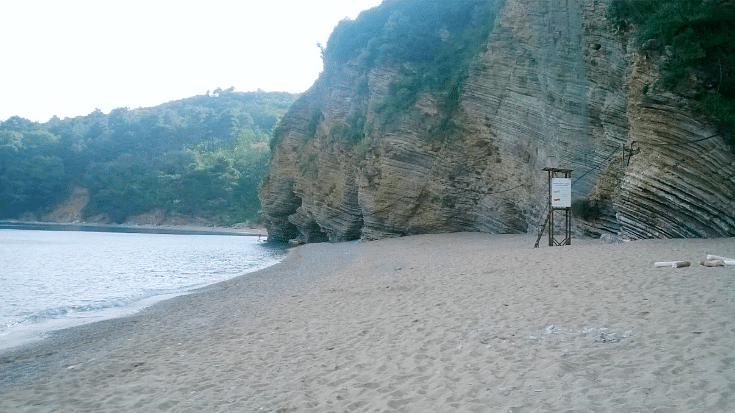
Image Owned By Author
This time of year is still warm enough for swimming, minus the peak summer bustle and prices.
September and October are ideal for a relaxed coastal trip or a food and wine holiday.
The sea stays warm well into October and harvest festivals begin inland.
Winter - November to March
It's quiet along the coast, but winter is when Montenegro's mountain regions come alive.
Head to Durmitor National Park or Kolašin for skiing, snowboarding and dramatic alpine landscapes.
If you're after cosy vibes, snow-dusted towns and hearty Balkan food, it's a hidden gem off-season.
Onward Travel From Montenegro
Montenegro is ideally placed for continuing your adventure across the Balkans.
However, if you're relying on public transport, bear in mind that train services in Montenegro and much of the region are limited or slow.
In most cases, buses are the only option for onward travel to surrounding countries.
On the plus side, however, they tend to be modern and comfortable.
- Albania - Buses run regularly from Ulcinj to Shkodër and Tirana, typically taking under four hours.
- Serbia - The Belgrade to Bar railway offers an epic scenic (and budget) ride into Serbia. It's one of the most beautiful train routes in Europe. Unless you take the overnight sleeper train and miss the scenery, as I did - oops.
- Croatia - Buses and shared transfers from Kotor and Budva to Dubrovnik are easy to find and popular. Be prepared for peak times and delays at the borders during summer.
- Bosnia & Herzegovina - From Montenegro, you can reach Mostar or Sarajevo by long-distance bus.
It's a good idea to check any visa rules and other requirements if you're travelling overland in the region.
Staying Connected In Montenegro
Staying online while exploring Montenegro doesn't need to cost a fortune.
But roaming charges can quickly add up when sharing those stunning bay views or mountain panoramas.
An eSIM for Montenegro provides instant and reliable connectivity without the risk of surprise roaming bills when you get home.
Choose how much data you need and for how long, install your eSIM before you fly, activate it on arrival and enjoy hassle-free data throughout your Montenegrin adventure.
Montenegro FAQs
1. When Is The Best Time To Visit Montenegro?
Spring (April to June) and autumn (September to October) offer warm weather and fewer crowds. Summer (July to August) is peak season, while winter is ideal for skiing and winter sports in Durmitor.
2. Do I Need A Visa To Travel To Montenegro?
UK and EU citizens can visit Montenegro visa-free for up to 90 days within a 180-day period. Always check official travel advice before departure.
3. What Are The Best Places To Visit In Montenegro?
Kotor, Budva, Durmitor National Park, Lake Skadar and Ulcinj are among Montenegro's top destinations for coastlines, culture and adventure.
4. Is There Wi-Fi In Montenegro?
Yes, most hotels, cafés and tourist areas offer free Wi-Fi. For 24/7 reliable internet access, a Montenegro eSIM is what you need for uninterrupted coverage during travel.
5. What Is The Best eSIM For Montenegro?
Airalo offers the best eSIMs for Montenegro, letting you stay connected across the country with easy setup, local rates and no physical SIM card swapping needed.



